-
 Bitcoin
Bitcoin $116400
-0.36% -
 Ethereum
Ethereum $4033
3.40% -
 XRP
XRP $3.302
-1.26% -
 Tether USDt
Tether USDt $1.000
-0.02% -
 BNB
BNB $796.1
1.67% -
 Solana
Solana $177.8
1.89% -
 USDC
USDC $0.9999
0.00% -
 Dogecoin
Dogecoin $0.2314
4.09% -
 TRON
TRON $0.3381
0.14% -
 Cardano
Cardano $0.7989
1.22% -
 Stellar
Stellar $0.4496
-1.84% -
 Chainlink
Chainlink $20.42
9.42% -
 Hyperliquid
Hyperliquid $41.17
0.88% -
 Sui
Sui $3.914
3.77% -
 Bitcoin Cash
Bitcoin Cash $584.7
1.52% -
 Hedera
Hedera $0.2632
-0.54% -
 Avalanche
Avalanche $24.09
3.40% -
 Ethena USDe
Ethena USDe $1.001
-0.02% -
 Litecoin
Litecoin $123.2
1.33% -
 Toncoin
Toncoin $3.318
-0.04% -
 UNUS SED LEO
UNUS SED LEO $8.984
-0.05% -
 Shiba Inu
Shiba Inu $0.00001323
2.85% -
 Uniswap
Uniswap $10.90
4.41% -
 Polkadot
Polkadot $3.999
3.34% -
 Dai
Dai $1.000
0.01% -
 Cronos
Cronos $0.1630
9.64% -
 Bitget Token
Bitget Token $4.484
0.82% -
 Monero
Monero $272.4
2.44% -
 Pepe
Pepe $0.00001173
6.03% -
 Aave
Aave $290.8
2.88%
What are the advantages of smart contracts?
Smart contracts automate agreements, boosting efficiency and security via blockchain's transparency and immutability, reducing costs and errors while increasing trust.
Mar 14, 2025 at 11:51 pm
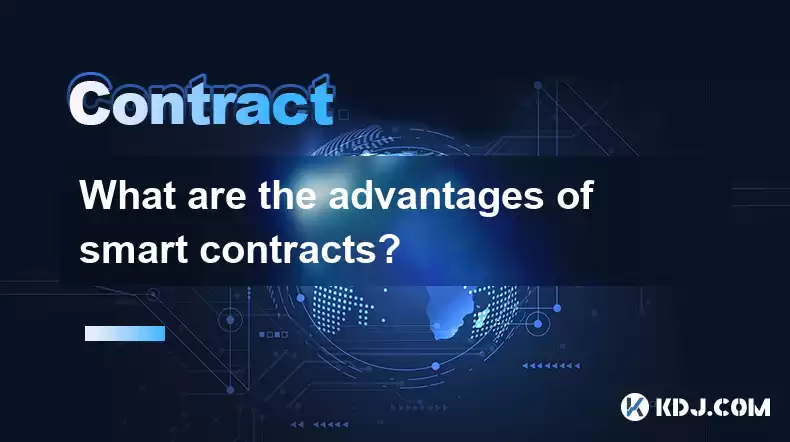
Key Points:
- Enhanced Security: Smart contracts minimize the risk of fraud and human error through automated execution.
- Increased Transparency: All transactions and contract terms are publicly viewable on the blockchain, fostering trust and accountability.
- Automation & Efficiency: Smart contracts automate processes, eliminating intermediaries and speeding up transactions.
- Cost Reduction: Automation reduces administrative costs and eliminates the need for intermediaries' fees.
- Improved Accuracy: Automated execution minimizes the chances of errors inherent in manual processes.
What are the advantages of smart contracts?
Smart contracts, self-executing contracts with the terms of the agreement between buyer and seller being directly written into lines of code, offer a multitude of advantages within the cryptocurrency ecosystem. Their decentralized and immutable nature fundamentally reshapes how transactions and agreements are handled. This leads to significant improvements in efficiency, security, and transparency.
Enhanced Security: Traditional contracts rely on intermediaries and legal processes which can be slow, expensive, and susceptible to fraud. Smart contracts, however, execute automatically upon fulfillment of pre-defined conditions. This eliminates the risk of human error or malicious manipulation, enhancing the overall security of the agreement. The immutability of the blockchain further reinforces this security, as any attempt to alter the contract after deployment is virtually impossible.
Increased Transparency and Trust: All aspects of a smart contract, including its code, terms, and execution history, are recorded on a public blockchain. This transparency fosters trust among participants, as everyone can verify the contract's legitimacy and track its progress. This open nature combats the opaqueness often associated with traditional contracts.
Automation and Efficiency: Smart contracts automate the execution of agreements, eliminating the need for intermediaries like lawyers or notaries. This automation streamlines processes, significantly reducing transaction times and associated costs. The automated nature ensures timely and accurate execution of the agreed-upon terms, regardless of external factors.
Cost Reduction: The automation facilitated by smart contracts drastically reduces administrative and operational costs. By eliminating intermediaries and their associated fees, smart contracts make transactions more affordable and accessible. This efficiency extends to various applications, from supply chain management to decentralized finance (DeFi).
Improved Accuracy and Reduced Errors: Manual processes are inherently prone to human error. Smart contracts, however, execute precisely according to their programmed logic, minimizing the possibility of mistakes. This accuracy ensures that agreements are executed as intended, reducing disputes and ambiguities.
Programmability and Flexibility: Smart contracts are not limited to simple agreements. Their programmable nature allows for the creation of complex, multi-stage agreements that adapt to changing conditions. This flexibility enables the development of innovative applications across various industries.
Immutability and Data Integrity: Once a smart contract is deployed on the blockchain, it cannot be altered or tampered with. This immutability guarantees the integrity of the agreement and protects against fraudulent modifications. This characteristic is crucial for maintaining trust and reliability.
Accessibility and Inclusivity: Smart contracts can facilitate access to financial and other services for individuals who may be excluded from traditional systems. Their decentralized nature removes geographical limitations and makes participation more inclusive.
Dispute Resolution: While smart contracts aim to automate agreements, they don't eliminate the possibility of disputes. However, the transparent and auditable nature of the blockchain provides a readily available record to assist in dispute resolution. This transparency aids in determining the correct course of action.
Scalability Challenges: While promising, smart contracts face scalability challenges, particularly as the number of transactions increases. Network congestion and high gas fees can hinder the efficient execution of smart contracts. Efforts are underway to improve the scalability of blockchain networks.
Security Vulnerabilities: Smart contracts, like any software, can be vulnerable to security exploits. Bugs in the code can be exploited by malicious actors, leading to contract failures or theft of assets. Thorough auditing and security testing are essential to mitigate these risks.
Legal and Regulatory Uncertainty: The legal framework surrounding smart contracts is still evolving. The enforceability of smart contracts and the liability of parties involved remain areas of uncertainty in many jurisdictions. Clarity in legal frameworks is crucial for widespread adoption.
Complexity and Development: Developing and deploying smart contracts requires specialized knowledge of programming and blockchain technology. This can create a barrier to entry for individuals and businesses without the necessary technical expertise.
Common Questions and Answers:
Q: Are smart contracts legally binding?
A: The legal enforceability of smart contracts varies depending on jurisdiction. While the code itself is immutable, the underlying legal agreements and their enforcement are subject to existing legal frameworks.
Q: How secure are smart contracts?
A: The security of a smart contract depends on the quality of its code and the security of the blockchain it runs on. Vulnerabilities in the code can be exploited, so thorough audits are essential.
Q: What are the limitations of smart contracts?
A: Smart contracts are limited by the capabilities of the underlying blockchain technology and the skills of the developers. Scalability issues and legal uncertainties also pose challenges.
Q: How can I create a smart contract?
A: Creating a smart contract requires programming skills and familiarity with blockchain development tools and platforms like Solidity (for Ethereum).
Q: What are some real-world applications of smart contracts?
A: Smart contracts find applications in diverse fields, including supply chain management, decentralized finance (DeFi), digital identity, and voting systems.
Q: What is the difference between a smart contract and a traditional contract?
A: Smart contracts are self-executing and automated, while traditional contracts rely on intermediaries and legal processes for enforcement. Smart contracts are recorded on a public blockchain, enhancing transparency and trust.
Disclaimer:info@kdj.com
The information provided is not trading advice. kdj.com does not assume any responsibility for any investments made based on the information provided in this article. Cryptocurrencies are highly volatile and it is highly recommended that you invest with caution after thorough research!
If you believe that the content used on this website infringes your copyright, please contact us immediately (info@kdj.com) and we will delete it promptly.
- SHIB Price, Meme Coin Mania, and the 250x Potential Hunt
- 2025-08-09 16:30:13
- SOL, ETFs, and AI: Crypto's Triple Threat Sensation!
- 2025-08-09 17:10:12
- Tokenized Stock on Solana: SOL Price Reacts to Exodus's Bold Move
- 2025-08-09 17:10:12
- Cardano, Mutuum Finance, Millionaires 2025: A New Wave of Crypto Fortunes?
- 2025-08-09 17:50:12
- Meme Coins on Blockchains in 2025: Hype or the Future?
- 2025-08-09 16:50:11
- World Liberty Financial, Public Listing, and WLFI Tokens: A New York Minute on the Trump-Backed Crypto Venture
- 2025-08-09 16:50:11
Related knowledge
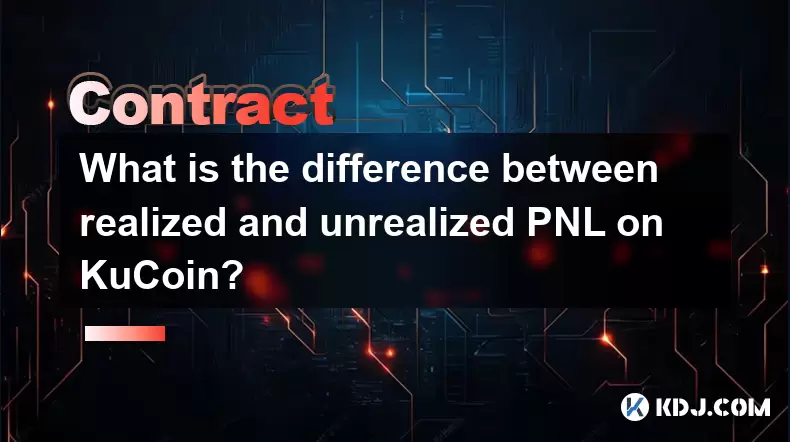
What is the difference between realized and unrealized PNL on KuCoin?
Aug 09,2025 at 01:49am
Understanding Realized and Unrealized PNL on KuCoinWhen trading on KuCoin, especially in futures and perpetual contracts, understanding the distinctio...
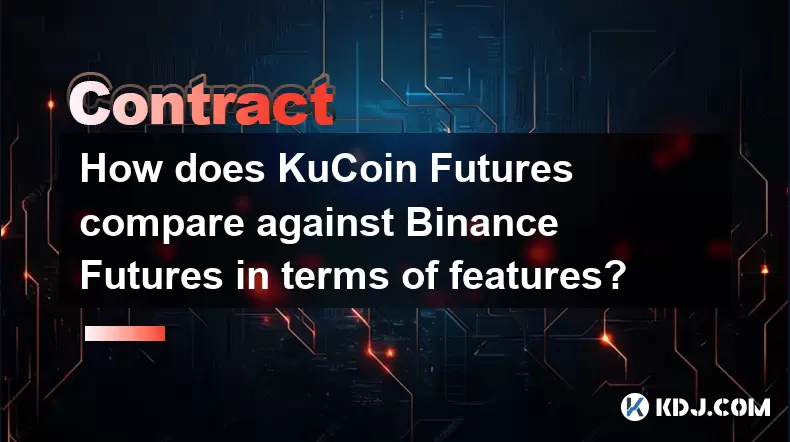
How does KuCoin Futures compare against Binance Futures in terms of features?
Aug 09,2025 at 03:22am
Trading Interface and User ExperienceThe trading interface is a critical component when comparing KuCoin Futures and Binance Futures, as it directly i...
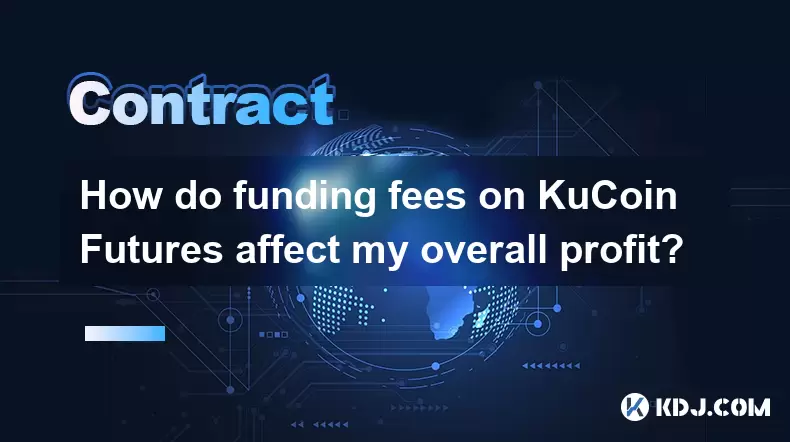
How do funding fees on KuCoin Futures affect my overall profit?
Aug 09,2025 at 08:22am
Understanding Funding Fees on KuCoin FuturesFunding fees on KuCoin Futures are periodic payments exchanged between long and short position holders to ...
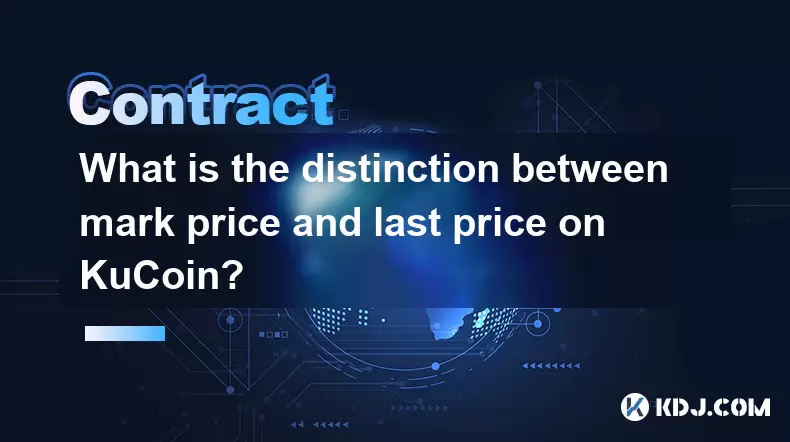
What is the distinction between mark price and last price on KuCoin?
Aug 08,2025 at 01:58pm
Understanding the Basics of Price in Cryptocurrency TradingIn cryptocurrency exchanges like KuCoin, two key price indicators frequently appear on trad...
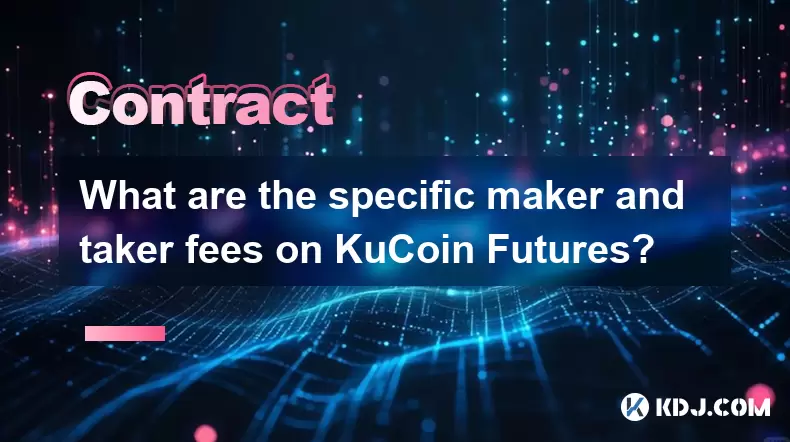
What are the specific maker and taker fees on KuCoin Futures?
Aug 08,2025 at 08:28am
Understanding Maker and Taker Fees on KuCoin FuturesWhen trading on KuCoin Futures, users encounter two primary types of fees: maker fees and taker fe...
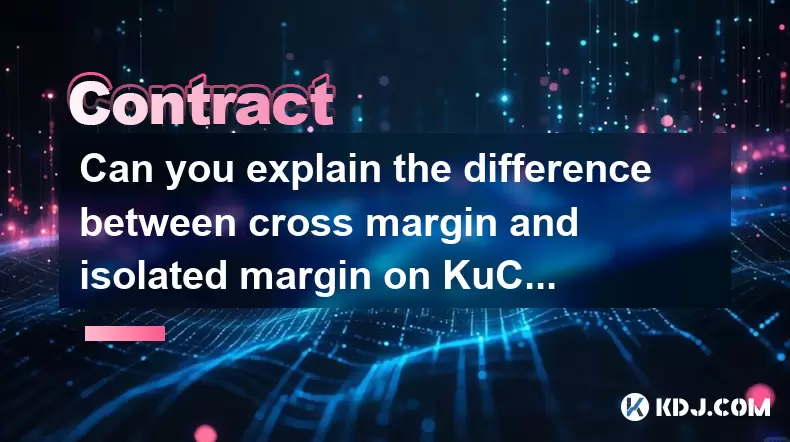
Can you explain the difference between cross margin and isolated margin on KuCoin?
Aug 09,2025 at 02:57am
Understanding Margin Trading on KuCoinMargin trading on KuCoin allows traders to borrow funds to increase their trading position beyond their actual c...

What is the difference between realized and unrealized PNL on KuCoin?
Aug 09,2025 at 01:49am
Understanding Realized and Unrealized PNL on KuCoinWhen trading on KuCoin, especially in futures and perpetual contracts, understanding the distinctio...

How does KuCoin Futures compare against Binance Futures in terms of features?
Aug 09,2025 at 03:22am
Trading Interface and User ExperienceThe trading interface is a critical component when comparing KuCoin Futures and Binance Futures, as it directly i...

How do funding fees on KuCoin Futures affect my overall profit?
Aug 09,2025 at 08:22am
Understanding Funding Fees on KuCoin FuturesFunding fees on KuCoin Futures are periodic payments exchanged between long and short position holders to ...

What is the distinction between mark price and last price on KuCoin?
Aug 08,2025 at 01:58pm
Understanding the Basics of Price in Cryptocurrency TradingIn cryptocurrency exchanges like KuCoin, two key price indicators frequently appear on trad...

What are the specific maker and taker fees on KuCoin Futures?
Aug 08,2025 at 08:28am
Understanding Maker and Taker Fees on KuCoin FuturesWhen trading on KuCoin Futures, users encounter two primary types of fees: maker fees and taker fe...

Can you explain the difference between cross margin and isolated margin on KuCoin?
Aug 09,2025 at 02:57am
Understanding Margin Trading on KuCoinMargin trading on KuCoin allows traders to borrow funds to increase their trading position beyond their actual c...
See all articles

























































































